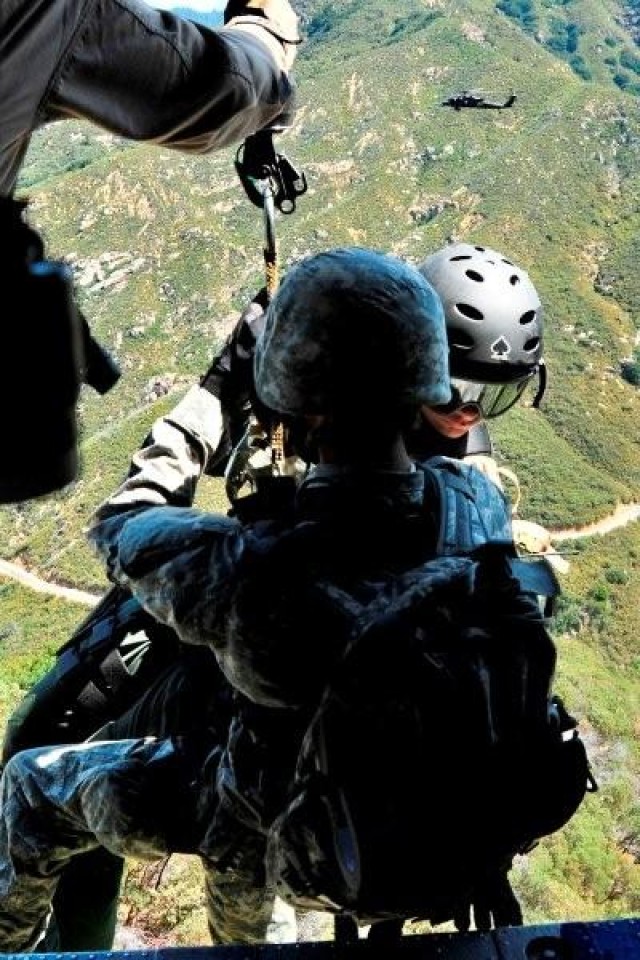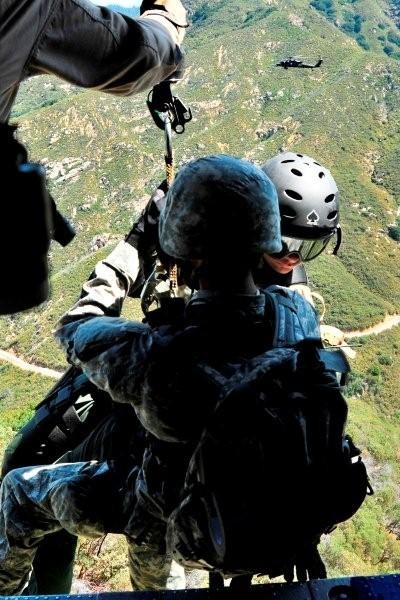FRESNO, Calif (Army News Service, Sept. 14, 2010) -- On a three-digit temperature day near Springville, Calif., a group of Soldiers clad in Kevlar helmets and black harnesses boarded a Pave Hawk helicopter and took to the skies.
Minutes later, the helicopter came to a stop and hovered high above the ground. From the sky, only treetops and a small open field - large enough for only two Soldiers to be lowered into - were visible. But as the two-person team descended from the aircraft on a hoist cable, broken trees, an abandoned makeshift camp site and piles of garbage came into view.
The broken trees and foliage led the way into what once was an illicit marijuana grow-site on public land. It was these Soldiers' job, working in conjunction with members of 21 government agencies, to reclaim this land as part of Operation Trident.
For three weeks this summer, members of the California Army National Guard's 649th Military Police Company from San Luis Obispo, Calif., joined forces with Joint Task Force Domestic Support-Counterdrug and other local and national agencies to help combat the effects of illegal marijuana growth in California's public forests in Fresno, Madera and Tulare counties.
"Illicit marijuana production on public lands is a huge problem throughout our county and participating counties," said Lt. Rick Ko, a member of the Fresno County Sheriff's Department and the incident commander for Operation Trident. "It is becoming a problem statewide and is probably going to grow into a national problem. It affects people who want to engage in recreational activities on public lands like hunting, fishing, camping and hiking."
About 75 percent of the nation's marijuana is grown in California, much of it on public land, Ko said, which can lead to dangerous confrontations with armed growers as well as severe environmental damage.
"These organizations are using pesticides and chemicals that are dangerous to the environment," Ko said. "They are polluting the watershed and destroying the land and habitat for animals."
To help combat the growing problem, the three counties' sheriff's departments called in law-enforcement and land-management agencies ranging from the U.S. Forest Service to the Drug Enforcement Administration.
"We really don't have the money to go take care of this problem," Ko said, "so when you start pulling all the resources from the Forest Service, the Parks Service, Fish and Game, the Bureau of Land Management, the three participating sheriff's departments, the Campaign Against Marijuana Planting and the National Guard, then you have enough resources to really address the problem and find permanent solutions."
Though many of these agencies have participated in this type of widespread eradication and clean-up effort in the past few years, including JTFDS-CD, this was the first time an entire National Guard unit stepped up to help out. For their annual training this year, about 120 Soldiers from the 649th MP Company assisted in prevention measures, officer safety during highway interdiction efforts and clean-up.
"As a commander, I'm ecstatic about this entire thing and the opportunities it provides to our unit and our Soldiers," said 1st Lt. Troy Jarrett, commander of the 649th.
The MPs provided a unique skill set that other volunteers couldn't. Because they are trained military police authorized to carry weapons, they were able to ride along with civilian law enforcement agents and provide security for the officers during highway interdiction missions.
Using information provided by an intelligence team, law-enforcement officers stop suspicious vehicles and check for evidence of marijuana growing or trafficking.
The MPs also assisted in reclamation missions.
Once an illegal marijuana grow site is discovered, an eradication team goes in and chops down all the plants. The growers are either arrested or escape into the dense woods, leaving behind an environmental nightmare. Makeshift irrigation pipes are often used to redirect river water to the grow sites, and pesticides and chemicals are left behind.
"The reclamation team will come and ... take all the irrigation out, pick up all [the growers'] left-behind clothes, toothbrushes, razors, soap," said Sgt. Noah Dawson of the 649th. "They'll take that all out and try to re-beautify the land back to the most natural state they possibly can."
Despite their efforts, some things cannot be fixed, such as downed trees used for camouflage, or burrow sites and mangled bushes used for sleeping.
"Only time is going to fix that, but all-in-all it looks 100-percent better than when you first get there," Dawson added.
The MPs spent anywhere from a few hours to a few days clearing out each grow site.
"It's not a bad mission, but it's a hard mission," Dawson said. Like most of his colleagues, he had never performed a mission like this one before. "You have to get in there and be willing to get dirty and put in the work, put in the man-hours. It's definitely good for the community and for the U.S."
Many of the Soldiers were also part of a prevention team. After learning techniques for teaching leadership and teamwork from full-time JTFDS-CD members, the MPs went to schools and talked to high school freshmen about staying off drugs.
Other 649th Soldiers acted in support, doing jobs such as communications, security, kitchen duty and administrative duties.
Having the 649th join the mission this year has proven to be a huge success, Ko said, though the Soldiers themselves may have benefitted the most.
"I'm part of something so big," Pfc. Natalie Church said. "I feel important helping to do good things for my community. I grew up here. It makes me feel good about the mission, like I'm actually doing something."
STATISTICS:
To date, Operation Trident has resulted in seizure of:
Marijuana plants 465,112
Lbs. of process marijuana 499
Ounces of cocaine 74
Ounces of methamphetamine 49
U.S. Currency $1,450
Weapons 33
Vehicles 02
Arrests 96
Tons of Trash 16.55
Miles of irrigation line 33
Pounds of fertilizer 5,630
Acres of public land Approx. 303
destroyed by illegal
marijuana cultivation
(Staff Sgt. Emily Suhr writes for the 224th Sustainment Brigade.)


Social Sharing